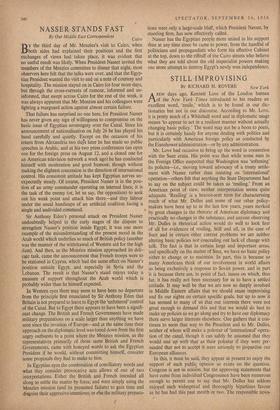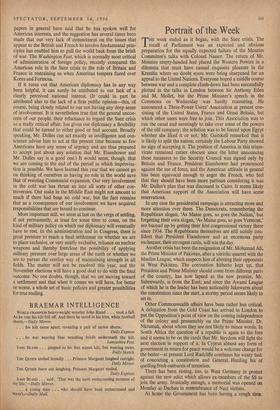STILL IMPROVISING
BY RICHARD H. ROVERE New York AFEW days ago, Kennett Love of the London bureau d the New York Times introduced to his readers an excellent word, 'resile,' which is to be found in our dic- tionaries but not in our discourse. According to Mr. Love, it is pretty much of a Whitehall word and in diplomatic usage means `to appear to act in a resilient manner without actually changing basic policy.' The word may not be a boon to poets, but it is certainly handy for anyone dealing with politics and particularly with American foreign policy as conducted by the Eisenhower administration—or by any adthinistration.
Mr. Love had occasion to bring up the word in connection with the Suez crisis. His point was that while some men in the Foreign Office suspected that Washington was 'softening' its policies—i.e., moving toward advocacy of a treaty settle- ment with Nasser rather than insisting on 'international' operation—others felt that anything the State Department had to say on the subject could be taken as 'resiling.' From an American point of view, neither interpretation seems quite adequate. 'Resiling' is a heaven-sent term for characterising much of what Mr. Dulles and some of our other policy- makers have been up to in the last few years, years marked by great changes in the rhetoric of American diplomacy and practically no changes in the substance, and anyone observing Mr. Dulles in rhetorical action would do well to look first of all for evidences of resiling. Still and all, in the case of Suez and in certain other current problems we are neither altering basic policies nor concealing our lack of change with talk. The fact is that in certain large and important areas, and specifically on the matter of Suez, we have no basic policy either to change or to maintain. In part, this is because so many Americans think of our involvement in world affairs as being exclusively a response to Soviet power, and in part it is because there are, in point of fact, issues on which, thus far, it has really not been necessary for us to have a settled attitude. It may well be that we are now so deeply involved in Middle Eastern affairs that we should cease improvising and fix our sights on certain specific goals, but up to now it has seemed to many of us that our interests there were not great enough to demand this and that we would do best to make up policies as we go along and try to have our diplomacy there serve larger interests elsewhere. One gathers that it con- tinues to seem that way to the President and to Mr. Dulles, neither of whom will make a polestar of 'international' opera- tion of the canal, though it can safely be assumed that they would- end up with that as their polestar if they were per- suaded that not to accept it were seriously to jeopardise our European alliances.
In this, it must be said, they appear at present to enjoy the support of such public opinion as exists on the question. Congress is not in session, but the approving statements that have come from individual Congressmen have been numerous enough to permit one to say that Mr. Dulles has seldom enjoyed such widespread and thoroughly bipartisan favour as he has had this past month or two. The responsible news- papers in general have said that he has spoken well for American interests, and the suggestion has several times been made that our very lack of commitment on the issues that appear to the British and French to involve fundamental prin- ciples has enabled him to pull the world back from the brink of war. The Washington Post, which is normally most critical of administration of foreign policy, recently compared the American role in the Suez crisis to the role of Britain and France in restraining us when American tempers flared over Korea and Formosa, If it turns out that American diplomacy has in any way been helpful. it can surely be attributed to our lack of a clearly perceived national interest. (It could in part be attributed also to the lack of a firm public opinion—this, of course, being closely related to our not having any deep sense of involvement. It is nevertheless true that the general uncon- cern of our people, their reluctance to regard the Suez crisis as a really critical affair, has given our diplomacy a flexibility that could be turned to either good or bad account. Broadly speaking, Mr. Dulles can act exactly as intelligence and con- science advise him to act at the present time because so few Americans have any sense of urgency and are thus prepared to accept just about any solution that Mr. Eisenhower and Mr. Dulles say is a good one.) It would seem, though, that we are coming to the end of the period in which, impiovisa- tion is possible. We have learned this year that we cannot go on thinking of ourselves as having no role in the world save that of resisting Communist expansion. Our very involvement in the cold war has thrust us into all sorts of other con- troversies. Our stake in the Middle East might not amount to much if there had beep no cold war, but the fact remains that as a consequence of our involvement we have acquired responsibilities that are bound to continue.
More important still, we seem at last on the verge of settling. if not permanently, at least for some time to come, on the kind of military policy on which our diplomacy will eventually have to rest. In the administration and in Congress, there is great pressure to reach a final settlement on whether we are to place exclusive, or very nearly exclusive, reliance on nuclear weapons and thereby foreclose the possibility of applying military pressure over large areas of the earth or whether we are to pursue the costlier way of maintaining strength in all fields. The matter will not be resolved this year, and the November elections will have a good deal to do with the final outcome. No one doubts, though, that we are moving toward a settlement and that when it comes we will have, for better or worse, a whole set of basic policies and greater possibilities for true resiling.



































 Previous page
Previous page